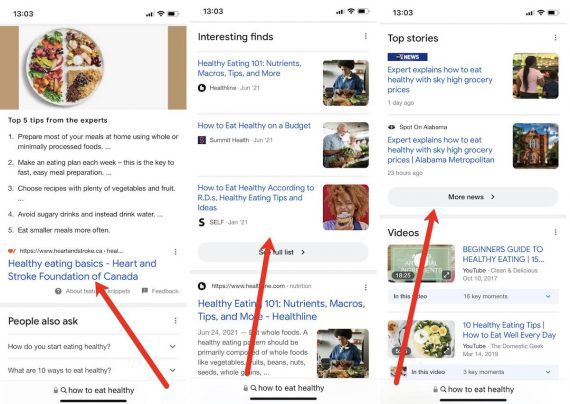Over the years Google has added sections in search result pages beyond traditional organic listings. Current examples include:
- Featured snippets (i.e., answer boxes),
- “Top stories” (newsworthy content),
- “Interesting finds.”
The latter two show up mostly on mobile devices. Below are screen captures of all three.

Google’s search results include featured snippets (left), “Interesting finds” (middle), and “Top stories.”
These additional sections were once opportunities, as they provided more exposure in search results.
But no more. Google now applies its “deduplication” algorithm wherein a URL appears only once on the first page of search results. If it shows in an additional section, the URL will not appear in the top 10 organic results.
If it ranks 11, however, the URL’s organic position is not affected.
Impact on Publishers
Generally, deduplication is not good for publishers because they lose potential positions. But I’ve seen no recent click-through data of the additional sections versus traditional organic listings.
The lack of data is understandable because Google’s search result pages are no longer predictable. Every result page is different with varying sections and rankings, all based on the searcher and device.
What we do know is all the additional sections appear for informational searches.
- Featured snippets provide quick answers without needing to click. A 2017 study confirmed this, finding that only 8% of searchers clicked the featured snippet, whereas 19% clicked the top organic result (below the featured box). Thus a page that ranks at the top position and is then featured could lose 10% of its organic traffic.
- “Interesting finds” and “Top stories” address facts or trends related to the search query.
There’s no easy way to monitor traffic from these extra sections. Google doesn’t include it in Analytics or Search Console.
So it’s likely bad news if Google includes your product or landing page in one of those sections, especially if its organic position was in the top 10.
No Choice
The existence of the additional sections and the related deduplication algorithm is an SEO challenge without an obvious solution. There’s not much we can do about it.
We cannot avoid appearing in the additional sections. There’s no easy SEO tactic that emphasizes organic rankings while bypassing those other areas.
Thus, monitor Google Analytics and Search Console to detect potential losses in organic traffic from deduplication. Then:
- Identify the pages losing organic clicks and the queries that drove them.
- Search those queries to confirm if your page appears in an additional section, accounting for the loss.
If you conclude an additional section is causing the traffic reduction, consider creating a different page to target that search term. Google’s deduplication applies to identical URLs. Two unique pages ranking for the same term could result in one retaining an organic ranking and the other appearing in an additional section.
But don’t create a mirror page. Analyze your search results to understand how each page could be different.
For example, if your initial page provides paragraphs of instructions, create a relevant listicle that summarizes each step. Or assemble a video and publish a transcript with the video embedded. That page could appear in a video carousel.
Regardless, don’t attempt to “deoptimize” a page to remove it from the additional sections. You risk losing its organic ranking altogether.
Likewise, avoid using a “no snippet” meta tag, which instructs Google not to show a description under the title in search results. That would remove all the snippets from the additional sections and organic listings, doing more harm than good.

A “no snippet” tag will result in a page being un-featured and remove the description from organic results, as shown in this example from the author’s website.
Little Control
There’s little we can control when it comes to balancing organic rankings and appearance in the additional sections. Always prioritize the rankings. Test alternative strategies for the other areas. After a month or two, assess your results and tweak accordingly. SEO is a slow, deliberate process.




